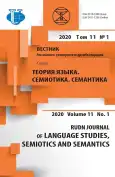Lexical Means of Verbalization of Uncertainty in the Arabic language on the example of Modern Best Sellers
- Authors: Denisenko V.N.1, Kalinina N.S.1
-
Affiliations:
- Peoples’ Friendship University of Russia (RUDN University)
- Issue: Vol 11, No 1 (2020)
- Pages: 36-47
- Section: COGNITIVE RESEARCH
- URL: https://journal-vniispk.ru/2313-2299/article/view/323265
- DOI: https://doi.org/10.22363/2313-2299-2020-11-1-36-47
- ID: 323265
Cite item
Full Text
Abstract
The article studies the peculiarities of verbalizing the category of ambiguity on the material of English literary texts translated into Arabic. Seven texts of writers-postmodernist - J. Barnes, 1. McCarthy, I. McEwan, D. Lodge, D. Mitchell, were chosen to be analyzed. The subject of the category of ambiguity research is both logic and philosophical, and linguistic. Lexemes denoting ambiguity are described in terms of their belonging to semantic (thematic) fields, including their contrastive and stylistic properties. There are involved proper lexical units denoting ambiguity, and contextual, occasional means, while their dictionary definitions do not reveal the semes of ambiguity. The study deals with the role and functions of nominative units reflecting ambiguity and uncertainty of the world contemporary literary discourse through translation into Arabic. The methodology is based on the functional interaction of lexis and grammar as one of the systemic linguistics principles. The study conclusions proceed from the provision on the Arabic language to demonstrate the system of various lexical means to express the ambiguity category, and their determinant to be implied in paradigmatic relations of language system, and syntagmatic relations between textual semantic units which both explain grammar structure of language and the nature of semantic correlations in its lexical subsystem. The authors draw a conclusion that both English and Arabic languages possess universal extralinguistic meaning of nominative ambiguity, while the semantic field nucleus fulfils the crucial function to select and assort proper means and units to realize the ambiguity category in texts. Differentiation of ambiguity nominations according to their application is not homogeneous due to lexical nominations making up the main means to realize ambiguity principle as both semantic and grammatical category. In course of studying the topic issue it seems adequate to study the topic of ambiguity conceptualization in languages of different structure and arrange the means to verbalize the ambiguity concept using the method of systemic comparison.
Keywords
About the authors
Vladimir N. Denisenko
Peoples’ Friendship University of Russia (RUDN University)
Author for correspondence.
Email: denisenko-vn@rudn.ru
DSc. in Philology, Full Professor, Head of the General and Russian Linguistics Department, Philological Faculty
6, Miklukho-Maklaya street, Moscow, 117198, Russian FederationNatalia S. Kalinina
Peoples’ Friendship University of Russia (RUDN University)
Email: ke6831@yandex.ru
Post-graduate student of the General and Russian Linguistics Department
6, Miklukho-Maklaya street, Moscow, 117198, Russian FederationReferences
- Barnes, J. (2011). The Sense of an Ending. London: Jonathan Cape. / J. زنراب ىنعمب ءاهنإ / J. زنراب. https://www.kutub-pdf.com/book/%D8%A7%D9%84%D8%A5%D8%AD%D8%B3% D8%A7%D8%B3-D8%A8%D8%A7%D9%84%D9%86%D9%87%D8%A7%D9%8A% D8%A9. html
- Sulimenko, N.E. (2008). Text and aspects of its lexical analysis N.E. Sulimenko (ed.). Moscow: Flint: Nauka. (In Russ.).
- Lodge, D. (2009). Deaf Sentence. London: Penguin Books. (جدول D. مصلا ةلمجلا 2010, E-resource).
- McEwan I. (2007b). On Chesil Beach. London: Jonathan Cape.
- McCarthy, T. (2006). Remainder. London: Alma Books.
- McEwan, I. (2006). Saturday. London: Vintage Books.
- Barnes, J. (2011). The Sense of an Ending. London: Jonathan Cape.
- McEwan, I. (2006). Saturday. London: Vintage Books.
- McEwan, I. (2007a). Atonement. London: Vintage Books.
- McCarthy, T. (2006). Remainder. London: Alma Books.
- McEwan, I. (2007a). Atonement. London: Vintage Books.
- Barnes, J. (2011). The Sense of an Ending. London: Jonathan Cape.
- McEwan, I. (2007a). Atonement. London: Vintage Books.
- McCarthy, T. (2006). Remainder. London: Alma Books.
- Lodge, D. (2008). Deaf Sentence. London: Penguin Books. (جدول D. مصلا ةلمجلا 2010, E-resource).
- Mitchell, D. (2004). Cloud Atlas. New York: Random House.
- McEwan, I. (2007a). Atonement. London: Vintage Books.
- Nikitin, M.V. (2007). Course of linguistic semantics. SPb: RSPU in. A.I. Herzen. (In Russ.).
- Mitchell, D. (2004). Cloud Atlas. New York: Random House.
- Popova, Z.D. & Sternin, I.A. (2007). Semantic and cognitive analysis of language. Voronezh: Istoki publishing House. (In Russ.).
- Sulimenko, N.E. (2009). Text and aspects of its lexical analysis. Moscow: Flint: Nauka. (In Russ.).
- Arshinov, V.I., Lukyanchuk, B.S. & Nikolsky, A.E. et all (2017). Semiotics of communicative waves of "subconscious": on topical issues of structural semiotics. Moscow: Sputnik. (In Russ.).
- Douwe Wessel, Fokkema. (2000). Knowledge and Commitment: A Problem-Oriented Approach to Literary Studies.
- Ilyin, I.P. (2001). Postmodernism. Dictionary of terms. Moscow: Inion ras-intrada. (In Russ.).
Supplementary files









